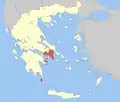Alimos
Alimos (Greek: Άλιμος) is a municipality in South Athens, Greece. It was formed in 1968 comprising two settlements, the suburban seaside town of Kalamaki (Greek: Καλαμάκι), and the inland community of Trachones (Greek: Τράχωνες). Alimos had 41,720 inhabitants in the 2011 world census.
Alimos
Άλιμος | |
|---|---|
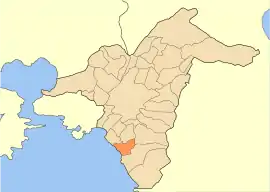 Alimos municipality | |
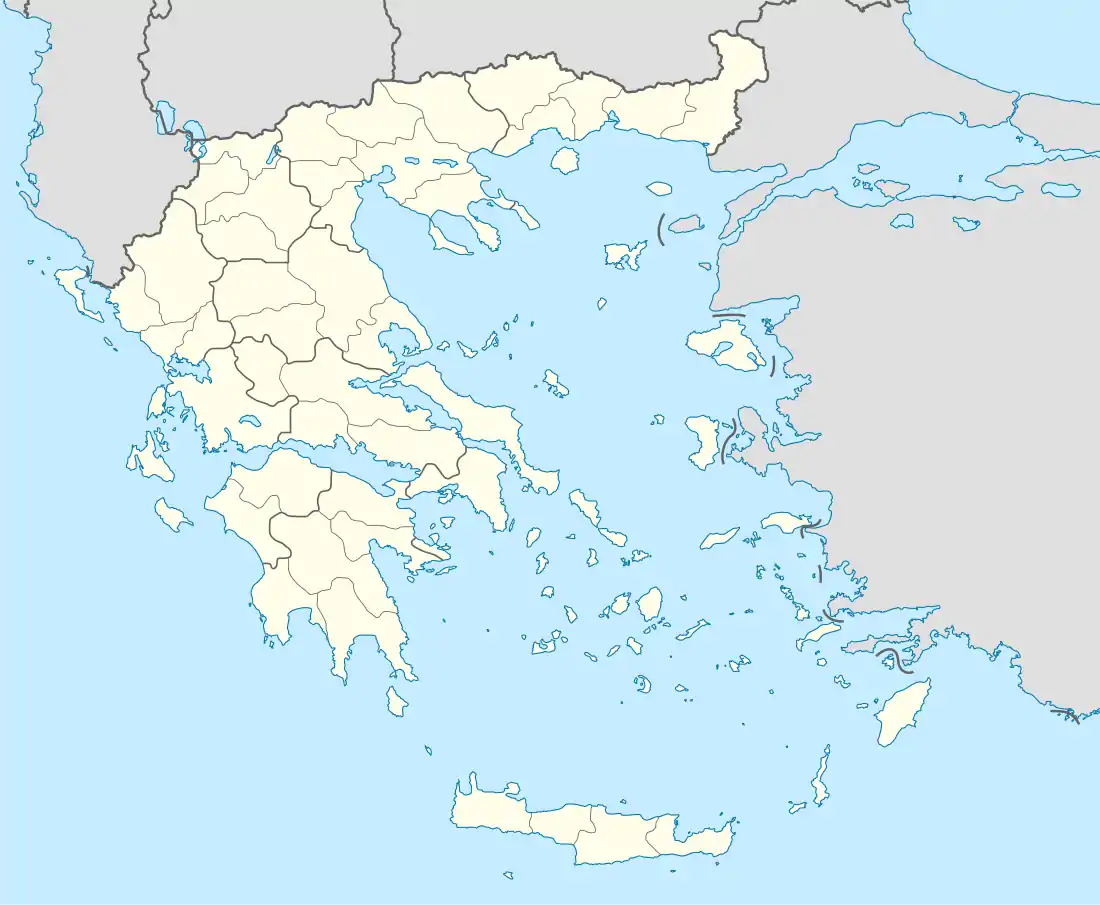 Alimos Location within the region 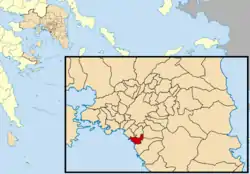 | |
| Coordinates: 37°55′N 23°43′E | |
| Country | Greece |
| Administrative region | Attica |
| Regional unit | South Athens |
| Districts | WWII disabled people Upper Straw (or Euonymeia or Trachons) Lower Straw (Straw) Vineyards Pan's Hill Cephallines Curatorials Customs Clearers Cythirians |
| Government | |
| • Mayor | Andreas Kondylis (Independent; since May 27, 2014) |
| Area | |
| • Municipality | 5.909 km2 (2.281 sq mi) |
| Highest elevation | 10 m (30 ft) |
| Lowest elevation | 0 m (0 ft) |
| Population (2011)[1] | |
| • Municipality | 41,720 |
| • Municipality density | 7,100/km2 (18,000/sq mi) |
| Time zone | UTC+2 (EET) |
| • Summer (DST) | UTC+3 (EEST) |
| Postal code | 174 xx |
| Area code(s) | 210 |
| Vehicle registration | Z |
| Website | www.alimos.gr |
Geography
AlimosBold text is situated on the Saronic Gulf coast, 8 km south of Athens city centre. The municipality has an area of 5.909 km2.[2] The Hellinikon Olympic Complex, built on the grounds of the former Ellinikon International Airport for the 2004 Summer Olympics, lies south of Alimos. The built-up area of Alimos is continuous with those of the neighbouring suburbs Palaio Faliro, Agios Dimitrios, Ilioupoli, Argyroupoli and Elliniko. Alimos has a large marina and several beaches.
.jpg.webp)
The main roads of Alimos are Poseidonos Avenue along the coast, Kalamakiou Avenue and Alimou Avenue. The nearest subway station is at Alimos metro station, in the eastern part of the municipality. The western, coastal part of the municipality is connected with Athens city centre by the Athens Tram.
History
The first settlements uncovered by archeologists in Alimos date back to the Neolithic period, and the excavation site can be found in the region of Euonymeia (Ano Kalamaki), immediately by the Vouliagmenis Avenue.
In classical antiquity, Halimous (Ancient Greek: Ἁλιμοῦς; also Alimous,[3] Ἀλιμοῦς[4]) was a fishing town on the outskirts of the city-state of Athens and constituted one of the demes of Athens. The area of Ano Kalamaki, known as Euonymeia, constituted a distinct settlement, which in classical antiquity became the urban (asty) Deme of Euonymos. Testament to its development during this period are the ruins of the amphitheater of Euonymos, quite unusual in the ancient world in its rectangular design. The site can be found on Archaiou Theatrou Street in Ano Kalamaki (just a few blocks away from the Neolithic site).
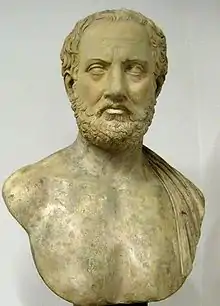
The most significant historical affiliation of Alimos is that with Thucydides. Thucydides was born in Halimous, and is often referred to as "Thucydides the Halimousian" (Greek: Θουκυδίδης ο Αλιμούσιος). The bust of Thucydides is the emblem of Alimos, which is commonly used between schools in the area. Furthermore, the First High School of Alimos is called Thoukydideio (Greek: Θουκυδίδειο), after him.
Kalamaki was part of the community of Brachami until 1927, when it became a separate community.[5] The community Kalamaki was abolished in 1968, when the municipality Alimos was founded.[6]
Culture
Education
Alimos has public and private schools of grades, apart from higher education, in several places throughout the city. The city has 12 public kindergartens, 8 public elementary schools, 6 public Junior High Schools (including a Music School [7]) and 5 High Schools (including one Technical High School). Furthermore, there are several private schools, where tuition fees are needed.
Sports
Alimos has two clubs with presence in panhellenic championships, the water polo club N.O. Kalamaki with presence in A1 Ethniki[8] and the football club Trachones F.C. with presence in Gamma Ethniki. In Alimos is located the Byzantine Sport Center that is used by the two sport clubs come from Constantinople, A.O. Tataula and A.S. Pera. These clubs settled in Alimos in 1973 and have many honours in Greek Table Tennis Championship.[9]
| Sport clubs based in Alimos | |||
|---|---|---|---|
| Club | Founded | Sports | Achievements |
| N.O. Kalamaki | 1947 | Water Polo | presence in A1 Ethniki water polo |
| Trachones F.C. | 1957 | Football | Presence in Beta Ethniki |
| A.L.F.A. B.C. | 1985 | Basketball | presence in A2 |
| A.O. Kalamaki | 1948 | Football | |
| Niki Alimou | 1926 | Football | |
| Enosi Trachonon - Dia Alimou | 2004 | Basketball | |
Commercial activity
.jpg.webp)
The commercial activity in Kalamaki or Alimos is concentrated in the major avenues that cross the city regional (Amfitheas-Poseidonos-Alimou) and the streets that are inside the city links (Thukididou-Kalamakiou-Theomitoros-Ionias-Dodekanisou).
Historical population
| Year | Population |
|---|---|
| 1981 | 27,036 |
| 1991 | 32,024 |
| 2001 | 38,047 |
| 2011 | 41,720 |
Many people here are the descendants of refugees from Kalkan Turkey, arriving in the Greek Genocide
References
- "Απογραφή Πληθυσμού - Κατοικιών 2011. ΜΟΝΙΜΟΣ Πληθυσμός" (in Greek). Hellenic Statistical Authority.
- "Population & housing census 2001 (incl. area and average elevation)" (PDF) (in Greek). National Statistical Service of Greece. Archived from the original (PDF) on 2015-09-21.
- Edward Dodwell, A Classical and Topographical Tour Through Greece During the Years 1801, 1805 and 1806 Vol. 1, Rodwell and Martin, 1819, p. 557.
- Etymologicum Magnum, Leipzig: Johann August Gottlieb Weigel, p. 58.
- "Κ. Καλαμακίου (Αττικής και Βοιωτίας)". EETAA local government changes. Retrieved 28 June 2020.
- "Δ. Αλίμου (Αττικής)". EETAA local government changes. Retrieved 28 June 2020.
- Music School of Alimos
- "Nautical Club Kalamaki". Nautical Club Kalamaki. Retrieved 14 March 2015.
- "titles" (PDF). Hellenic Table Tennis Federation. Retrieved 14 April 2015.
External links
- City of Alimos official website (in Greek)
- The Music School of Alimos (in Greek)
